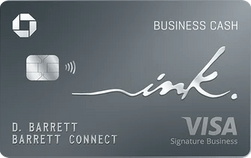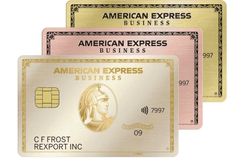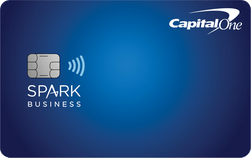Business Credit Cards Explained: Liability, Eligibility, and How to Get Approved (Even as a Sole Proprietor)
From personal guarantees to credit reporting and Chase 5/24 strategy, this guide covers everything you need to know—whether you’re a freelancer, startup, or scaling your business.

We've talked about business credit cards in the past, but a few more frequently asked questions have popped up. Here's everything you ever wanted to know about business credit cards.
Who is liable for business credit cards?
Who is liable for business credit cards? For most business cards (assuming it's a business card and not a corporate card), even if you use an EIN, they'll pull your credit report using your social security number. Therefore, you are going to be liable for the card. Whenever you apply for a credit card, there is a terms of service you need to agree to.
Individual and Company Liability: You understand that by responding to this offer you agree to be personally responsible, both individually and jointly with the Company, for payment of all balances incurred on all cards and accounts issued pursuant to this application now or whenever such additional accounts may be established in the future.
By submitting this application, you, as an individual and the Authorizing Officer of the Company, (a) are requesting us to open an Account in the name of the Company, (b) are requesting that we issue Card(s) as you direct, (c) are agreeing to be jointly and severally liable with the Company for all charges to the account.
Just like any credit card, you are liable for the expenses and payments. The credit issuers have the right to come after you if you default because you signed the cardmember agreement.
If you issue employees cards, you'll be liable as well. The best practice is to have internal controls set up to monitor transactions.
What's the point of having business credit cards?
The main things we're focused on in this post is to optimize the spend you're already doing and getting a signup bonus.
The benefit of having a business credit card is that you can optimize for different categories. Most cards offer 3x and 5x back on categories you typically don't get with personal cards. For example, the Ink Business Cash® Credit Card offers 5x back on cable and phone bills.
Another reason why people pursue business credit cards is that they have good intro bonuses that provide out sized value on spend.
Who is eligible to apply for a business credit card?
The one thing people don't realize is that businesses come in all shape and sizes. Yes, there are corporations and LLCs, but there are also sole proprietorships.
In the state of California, you do not need additional documentation if you operate as a sole proprietor. I've had friends who are thinking of starting side hustles who applied for the Chase Ink Preferred and were successful. They didn't have any income, but they expect to make at least $5,000 this year.
In what situations should you use a business credit card?
The business card is intended to be used for business purposes, and that the card is being issued to a public or private company including a sole proprietor or employees or contractors of an organization.
In circumstances like a sole proprietorship, it gets a bit foggy. For example, if I was a videographer creating content for other people, but I also use the camera, is that ok?
As long as the expense is justifiable, that's fine to me, but technically it doesn't matter.
I do a lot of reading online for data points, and I have yet to hear of someone getting shut down for making purchases that weren't business expenses. Can it happen? Yes, but I don't think it's likely.
The biggest risk of using your card for nonbusiness expenses isn't getting shut down; it's losing consumer protections.
Business protections vs. consumer protections
Whenever you get approved for a new card or do a product change, the credit issuer will send an updated benefits and protections guide.
My biggest concern is black swan event; something that's difficult to predict and can be very costly. A good example is if you rent a car and get into an accident.
Even though your business card might have CDW, you might be in a position where you need to "prove" that the car rental was related to business.
The retail price for an intermediate car like a Honda Civic is $20,000. If you were to get into an accident and the car was declared a total loss, you would be responsible for recovering the car if for some reason the credit card didn't honor CDW.
Again, it's not likely to happen, but I like to be proactive and think of worst case scenarios.
What about the credit report?
For the most part, business cards don't have an affect on your credit report unless you default on payments. Most business cards can only harm your credit, and not help it.
- Utilization- most business cards don't report utilization on your personal report
- Payment history- most business cards will not show the positive effects of on-time payments
- Derogatory marks - these are reported
- Average age of accounts - not affected
- Total Accounts- not affected
- Credit Inquiries- you have to take a hard inquiry to get the account
A lot of people signup for business cards if they're under Chase 5/24 because it doesn't show up on their credit report.
For example, my friend was trying to time getting Southwest Companion Pass. He ended up getting business cards to stay under Chase 5/24 to get the Companion Pass.
Capital One business cards are the exception among major issuers; they'll post on your credit card.
Corporate Cards
Corporate cards are a whole different ballgame. It requires you to have a corporation with at least three years of financial statements and sometimes tax returns.
Different programs have different requirements for transaction size and what they want to see regarding revenue. My guess is that they're committing an account manager to you and want to make sure that they get positive expected value.
If we play with Amex's online tools, you can get an idea of what they're looking for.
For Amex:
- Revenue <$5mm, 5-10mm, 10-25mm
- Company size: 1-10, 11-50, 51-100
For a company with 1-10 employees, you need $10-$25 million annual revenue for them to recommend corporate cards.
For under <$5 million in annual revenue, even if you have 1000+ employees, they recommend OPEN cards and not corporate cards.
If you're between $5-10 million in revenue, they'll only recommend corporate cards only if you have between 51-100 employees (not 1-10 or 11-50).
💳 Featured Card Offers

Earn $750 bonus cash back

Earn 200,000 Membership Rewards® points
Terms apply | Rates & Fees

LIMITED-TIME OFFER: Earn up to 400,000 miles
In this article
- Who is liable for business credit cards?
- What's the point of having business credit cards?
- Who is eligible to apply for a business credit card?
- In what situations should you use a business credit card?
- Business protections vs. consumer protections
- What about the credit report?
- Corporate Cards
💳 Featured Card Offers

Earn $750 bonus cash back

Earn 200,000 Membership Rewards® points
Terms apply | Rates & Fees

LIMITED-TIME OFFER: Earn up to 400,000 miles

